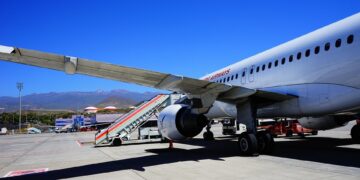
VALVERDE (THE IRON), 29 Mar. (EUROPA PRESS) –
The General Director of Agriculture of the Government of the Canary Islands, Augusto Hernández, the President of the Cabildo, Alpidio Armas, the Mayor of La Frontera, Pedro Miguel Ángel Acosta, and the Island Councilor for Rural Affairs, David Cabrera, representatives of the Cooperativa del Campo de La Frontera y Frutas de El Hierro SAT and technicians from the regional and insular administration as well as the Canarian Institute for Agrarian Research (ICIA) met this Wednesday to join forces and lay the foundations for an agreement that guarantees the sustainability of pineapple cultivation tropical fruit and the improvement of its commercialization.
Among them, the improvement of the productions that have been affected, sustainability and marketing stand out, which include a renewal of the plant material of the plots with low productivity and the maintenance of a nursery that allows a supply of plant material with sanitary guarantees.
These circumstances, together with the presence of other harmful organisms and the lack of effective phytosanitary control tools in tropical pineapple cultivation, mean that commercial plantations that remain productive for three crop cycles do not cover production costs.
During the meeting, the administrations analyzed the entry of tropical pineapple from third countries and the non-compliance with the 1987 order and the phytosanitary problems, mainly the cottony mealybug ‘Dysmicoccus brevipes’, as well as the problems derived from the lack of disinfection of the production grounds. crop.
The mealybug causes two problems in the cultivation of tropical pineapples, on the one hand, weakening of the plants due to the feeding action of the pest and, on the other hand, its own death, details the Ministry in a note.
Currently, it is difficult to obtain authorizations for phytosanitary products for these harmful organisms due to the high costs involved in preparing a registration dossier and the low income (returns) that manufacturers will obtain, given that European regulations are increasingly restrictive. regarding the use of phytosanitary products of chemical origin, warns the department.
For this reason, it seems necessary that the form of production of tropical pineapple is carried out under Integrated Pest Management (IPM) standards or organic production, where non-chemical biological and biotechnological pest control methods are very present.
In order to achieve the objective set, it is proposed to carry out a series of activities, which, although they are focused on the selection of plant material of ‘Roja Española’ (a variety of pineapple that gives character to El Hierro production), leaves open the door to others that could be of interest in the future.
GERMOPLASM BANK
For this, the ICIA proposes the creation of a germplasm bank with the material selected in the field; the in vitro propagation of the plant material selected in the field; carrying out comparative trials in the field of clones of ‘Roja Española’ selected against other introduced cultivars of interest; field trials for the control of Dysmicoccus brevipes “Cochineal mealybug of the tropical pineapple” and diseases associated with the soil, among other actions.
As an alternative to the use of phytosanitary products, work is being done, in coordination with the administrations, the ICIA and the tropical pineapple sector, on methods such as biosolarization for soil disinfection.
With this procedure, a gas is generated that has disinfectant power and is capable of controlling fungi, and since there are no authorized disinfectants, this method is applied.
The general director of Agriculture, Augusto Hernández, explained that “it is necessary to act now, and for this reason the possibility of obtaining exceptional authorizations from the Ministry of Agriculture, Fisheries and Food to apply phytosanitary products that can solve the problem of mealybug infestation and products associated with soil disinfection prior to cultivation”.
In his opinion, “these are important steps to move forward and prevent pineapple production from being paralyzed.”
Likewise, he added that this agreement “proposes solutions in the short, medium and long term, although the fundamental thing is to obtain healthy plant material with a very high productive capacity that can satisfy the needs of the market, in such a way that a selection of plant material is prepared that can be reproduced.
For Hernández, “the important thing is to have fields of mother plants that ensure that they are healthy.”
WEAPONS: “THE SITUATION IS COMPLICATED”
The president of the Cabildo, Alpidio Armas, pointed out that “the situation in the pineapple sector is complicated, and to improve this situation, different solutions have been put on the table and there is a commitment from the regional Executive and the Cabildo with farmers to alleviate the precariousness in which they are mired and enable lines of help and subsidies”.
In parallel to these actions, he pointed out, “we have other projects that involve bringing healthy cuttings and planting only what is healthy, we have to start from scratch and give tropical pineapple possibilities for the future, a crop that is not only of great economic importance, but it gives character to El Hierro from the point of view of the primary sector”.
The mayor of La Frontera, Pedro Miguel Ángel Acosta, highlighted that “there has been a decrease of approximately 40% in the production of tropical pineapple, with a series of problems that must be overcome together, because economic performance has decreased considerably.”
Pablo Carmona, from the Frutas de El Hierro SAT cooperative, agreed on the suitability of adopting these measures urgently, with a need to renew the sector after 40 years with current production.
“Now we practically have to start from scratch, with 80% of the plants affected, so they have to be changed and cleaned up,” he said.
At the work meeting, the Insular Water Council also offered the data that demonstrates the quality of irrigation water in the Valle del Golfo.
















